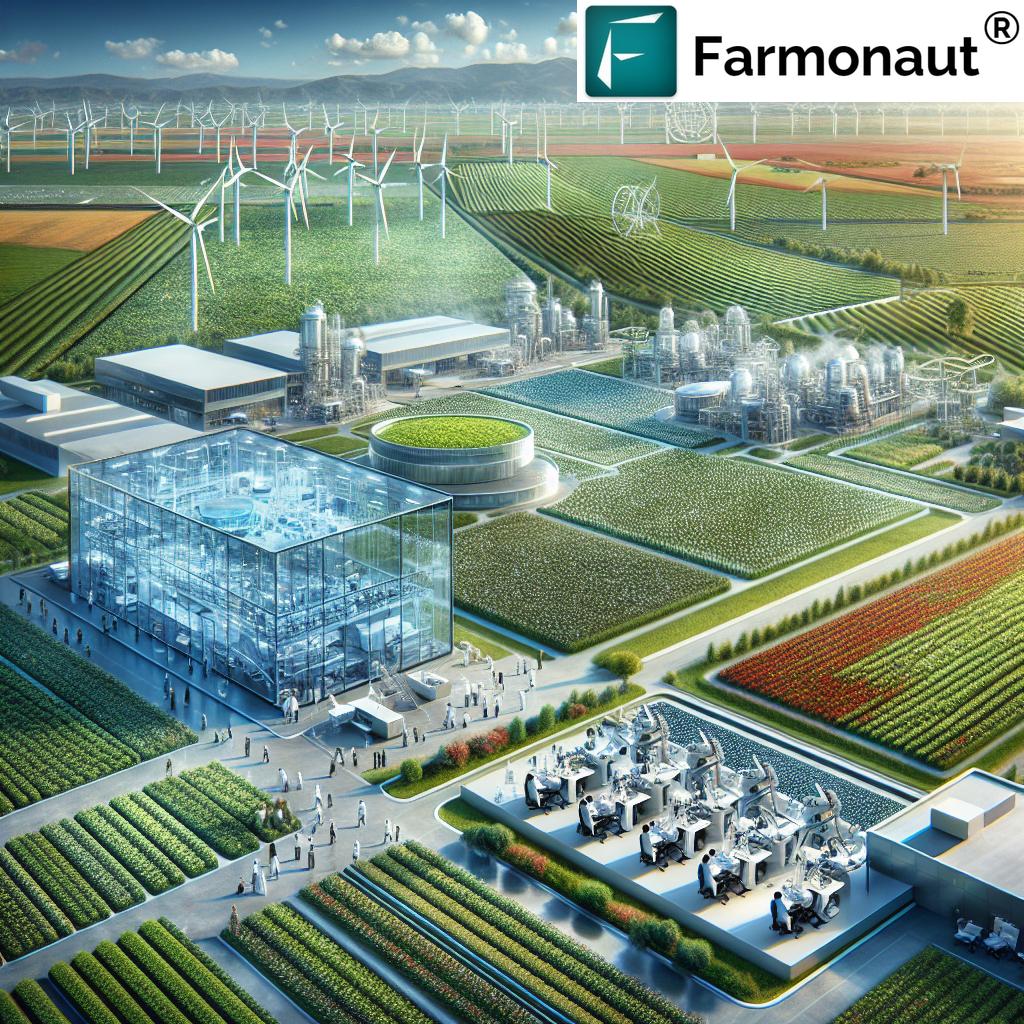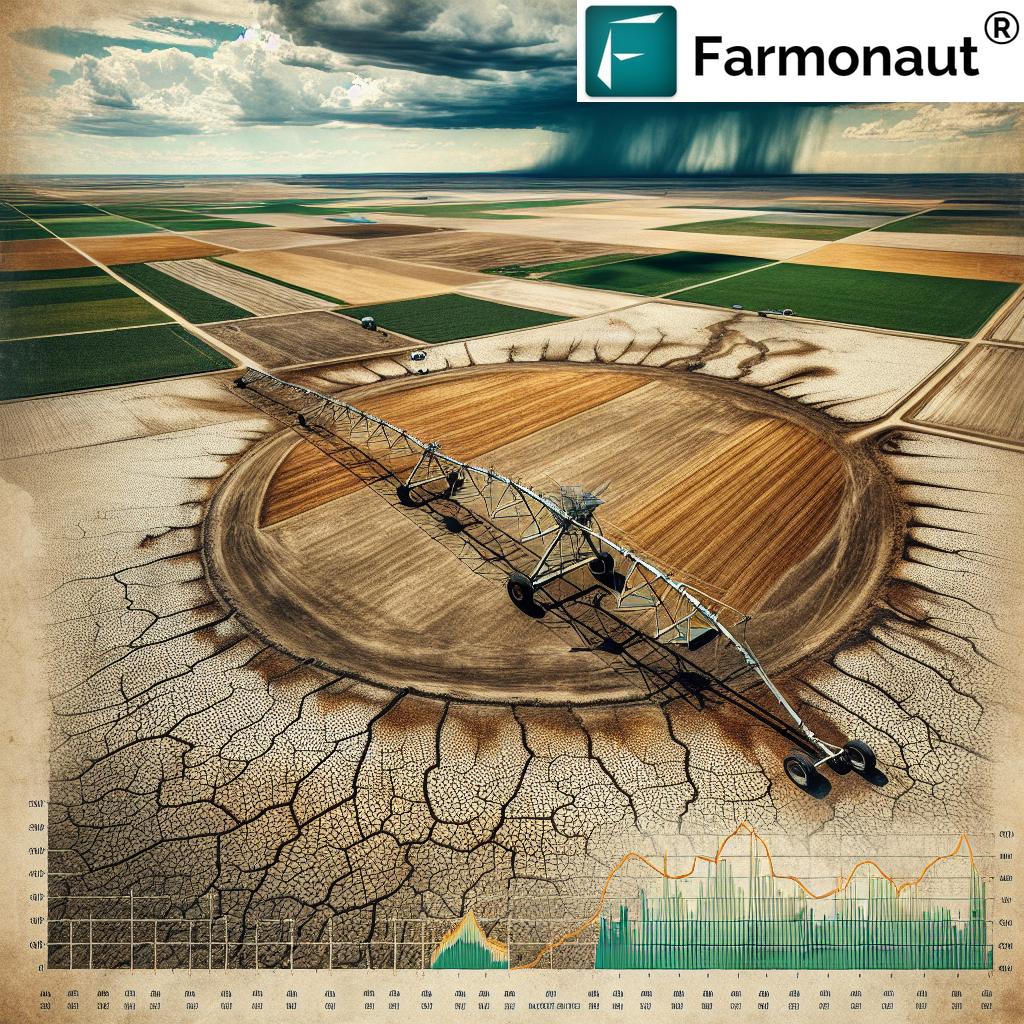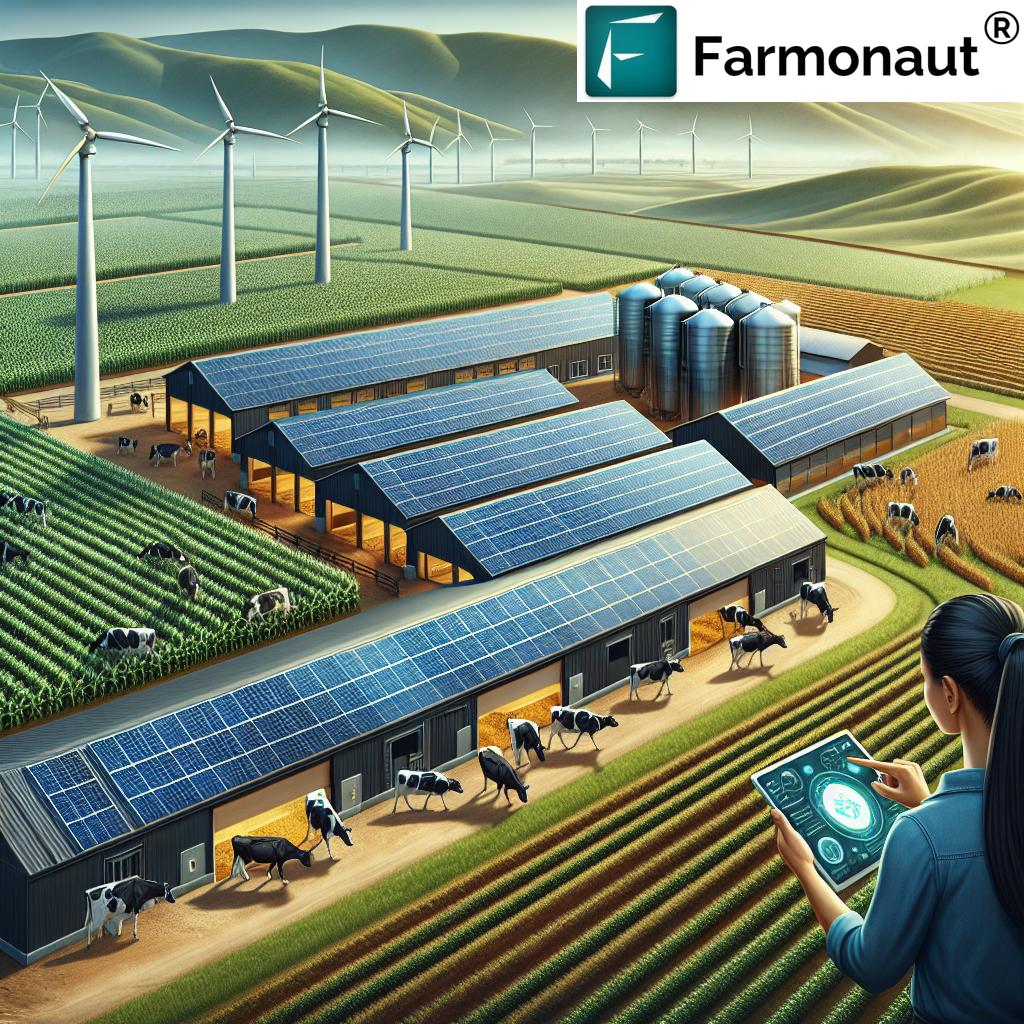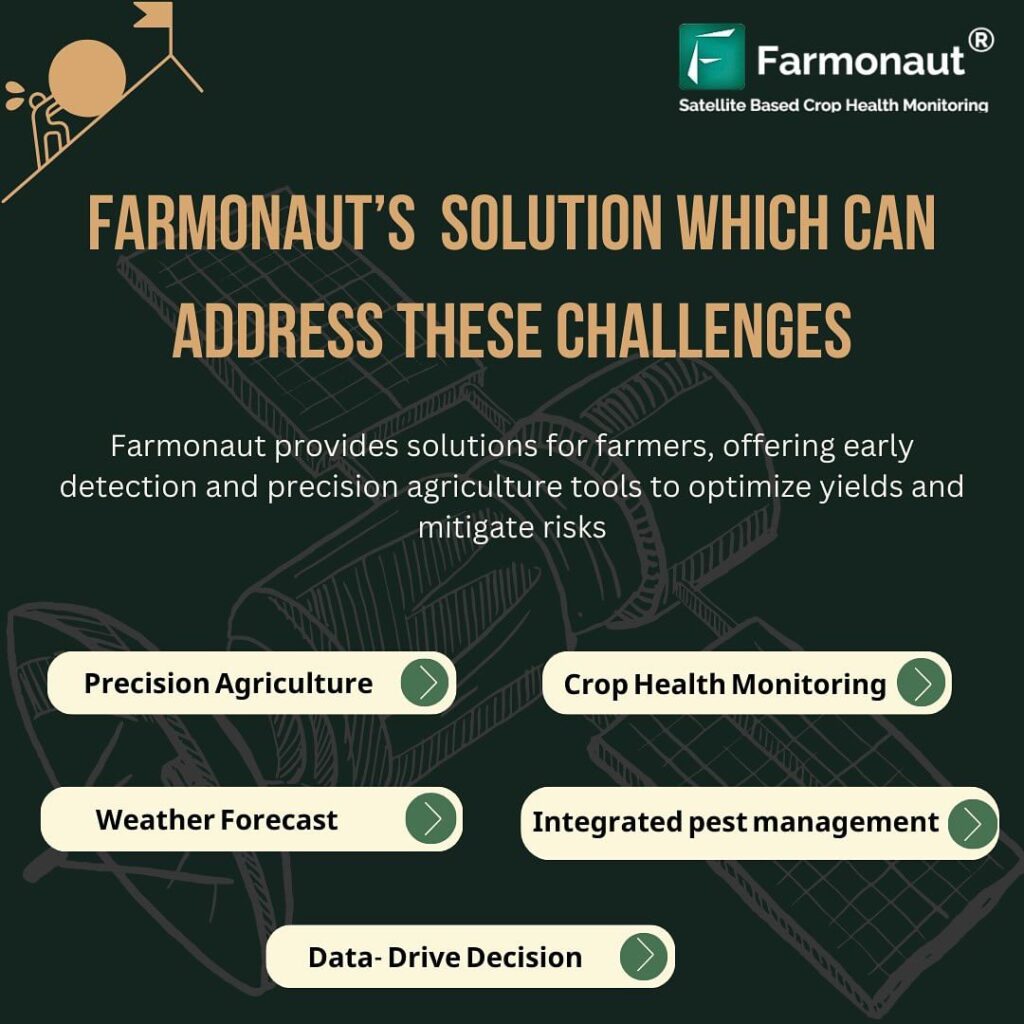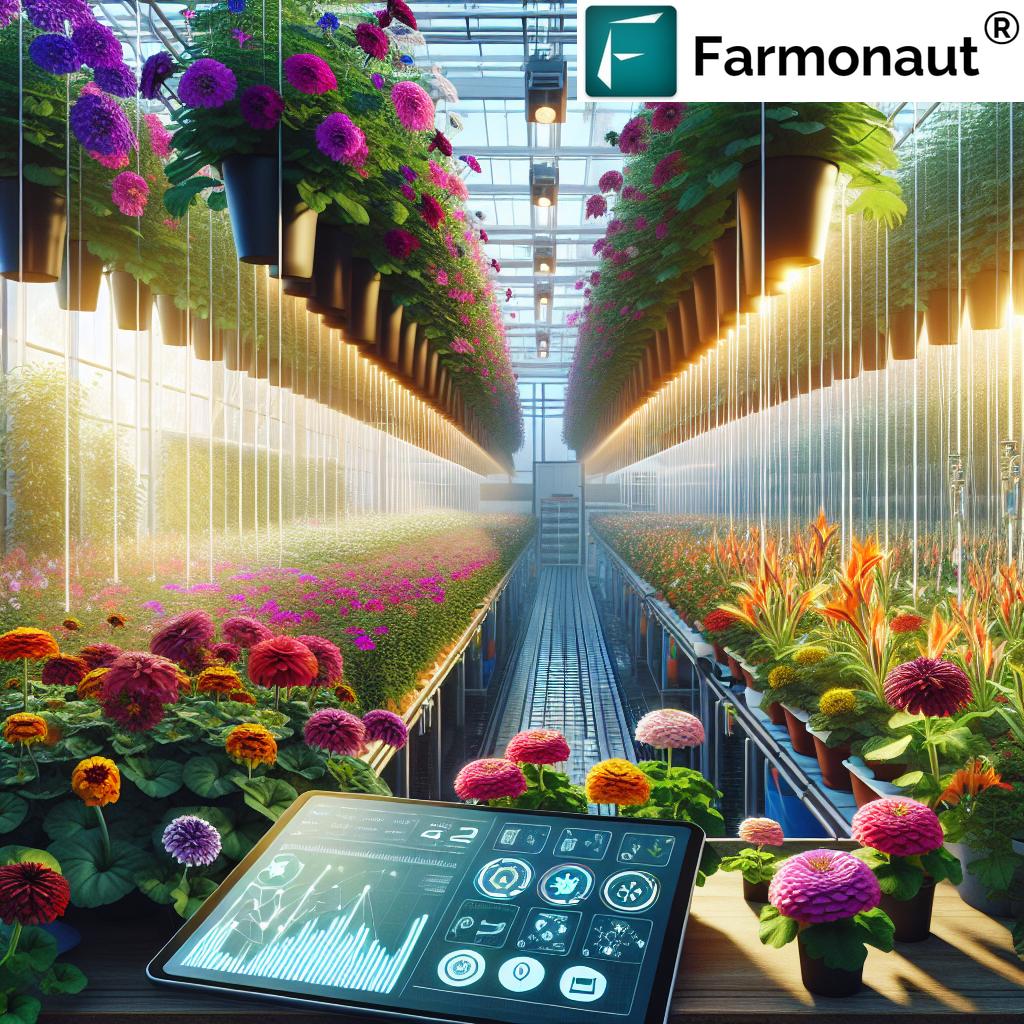Mastering Water Management for Optimal Corn Yield: Iowa’s Guide to Hydraulic Growth and Nutrient Transport
“Corn plants utilize approximately 25 acre-inches of water per growing season for optimal growth and yield.”
Welcome to our comprehensive guide on water management for corn production in Iowa. As experts in agronomy and satellite-based farm management, we at Farmonaut understand the critical role that water plays in maximizing corn yields. In this blog post, we’ll explore the intricate relationship between water and corn growth, diving deep into the science of hydraulic growth, nutrient transport, and evaporative cooling. Whether you’re a seasoned farmer or an aspiring agronomist, this guide will equip you with the knowledge to optimize your corn production through effective water management strategies.
The Importance of Water in Corn Production
Water is the lifeblood of corn plants, serving multiple crucial functions throughout their growth cycle. Let’s break down the four key roles that water plays in corn development:
- Evaporative Cooling: Water helps regulate plant temperature through transpiration.
- Nutrient Transport: It facilitates the movement of essential nutrients throughout the plant.
- Hydraulic Cell Growth: Water is vital for cell expansion and overall plant growth.
- Hydrogen Provision: It’s a key component in photosynthesis, providing hydrogen atoms.
Understanding these functions is crucial for implementing effective water management strategies in corn production. Let’s delve deeper into each of these aspects.
Evaporative Cooling: Nature’s Air Conditioning for Corn
Evaporative cooling is a remarkable process that helps corn plants maintain optimal temperatures, especially during hot Iowa summers. Here’s how it works:
- As water evaporates from the leaves through tiny pores called stomata, it absorbs heat energy.
- This process effectively cools the plant, preventing heat stress that could otherwise damage tissues and reduce yield.
- On a hot day, a single corn plant can transpire up to 4 liters of water!
“A significant portion of the water absorbed by corn plants is lost through transpiration, contributing to evaporative cooling.”
Effective water management ensures that corn plants have enough moisture to maintain this cooling mechanism without wasting water resources. This is where precision agriculture tools, like those offered by Farmonaut, can be invaluable. Our satellite-based crop health monitoring system can help farmers track soil moisture levels and make informed decisions about irrigation timing and volume.
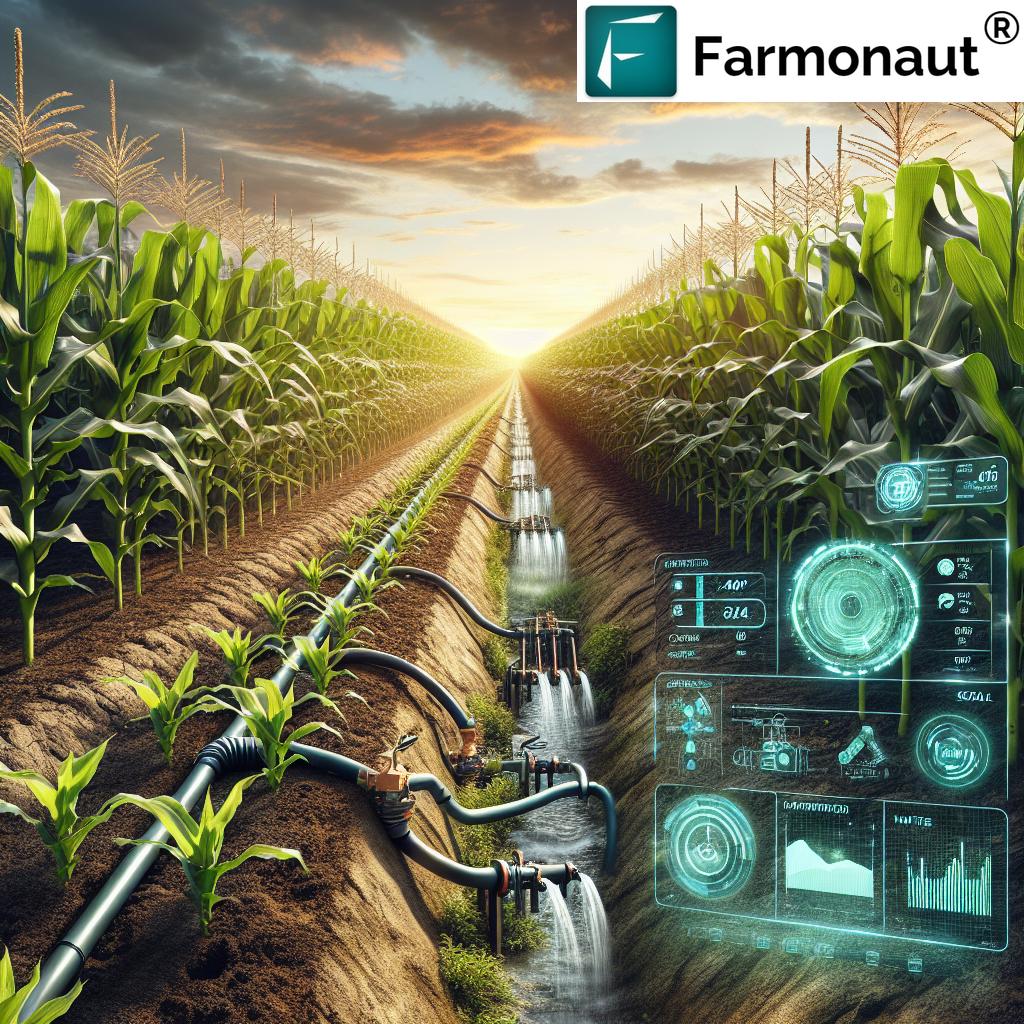
Nutrient Transport: The Corn Plant’s Highway System
Water serves as the primary medium for nutrient transport within corn plants. This process is critical for several reasons:
- Dissolved nutrients are carried from the soil to the roots through water absorption.
- The plant’s vascular system, particularly the xylem, uses water to distribute these nutrients throughout the plant.
- Essential elements like nitrogen, phosphorus, and potassium rely on water for efficient distribution.
Proper water management ensures that nutrients are consistently available and mobile within the plant. This is especially important during key growth stages, such as tasseling and silking, when nutrient demands are high.
At Farmonaut, our Jeevn AI Advisory System can provide real-time insights into crop health, helping farmers optimize their fertilizer application based on plant needs and water availability. This integrated approach to water and nutrient management can significantly boost corn yields.
Hydraulic Cell Growth: The Power of Turgor Pressure
Water is fundamental to the physical growth of corn plants through a process known as hydraulic cell growth. Here’s how it works:
- As water enters plant cells, it creates turgor pressure, which is essential for cell expansion.
- This pressure helps maintain the plant’s structure and supports the development of leaves, stalks, and ears.
- Inadequate water can lead to wilting and stunted growth, directly impacting yield potential.
Maintaining optimal soil moisture throughout the growing season is crucial for supporting hydraulic growth. Iowa farmers can benefit from using Farmonaut’s satellite-based soil moisture monitoring to ensure their corn crops receive adequate water for continuous growth and development.
Hydrogen Provision: Fueling Photosynthesis
Water plays a vital role in photosynthesis, the process by which corn plants convert sunlight into energy. Here’s why it’s important:
- Water molecules are split during photosynthesis, providing hydrogen atoms for glucose production.
- This process is essential for plant growth and the development of corn kernels.
- Insufficient water can limit photosynthesis, reducing overall plant productivity and yield.
Ensuring a steady water supply throughout the growing season is crucial for maintaining high rates of photosynthesis. Farmonaut’s weather forecasting tools can help farmers anticipate dry spells and plan irrigation accordingly, maximizing photosynthetic efficiency and yield potential.
Water Usage Throughout the Corn Growing Season
Understanding how corn plants use water throughout their growth cycle is crucial for effective water management. Let’s break down the water requirements and their impact on yield at different growth stages:
| Growth Stage | Water Usage (acre-inches) | Primary Water Functions | Impact on Yield |
|---|---|---|---|
| Seedling (VE-V6) | 1-2 | Germination, root establishment | Critical for stand establishment |
| Vegetative (V7-V16) | 6-8 | Rapid growth, nutrient uptake | Determines potential ear size |
| Tasseling (VT) | 1-2 | Pollen development | Crucial for pollination success |
| Silking (R1) | 2-3 | Silk emergence, fertilization | Directly affects kernel number |
| Grain Fill (R2-R6) | 8-10 | Kernel development, dry matter accumulation | Determines final kernel weight and yield |
As the table shows, corn plants require varying amounts of water throughout their lifecycle. The grain fill stage, in particular, demands a significant portion of the total water usage. Effective water management during this period is crucial for achieving high yields.
Soil Moisture Management: The Foundation of Corn Water Management
Maintaining optimal soil moisture is critical for corn production in Iowa. Here are some key considerations:
- Ideal soil moisture for corn growth is typically between 50-70% of field capacity.
- Excessive moisture can lead to nutrient leaching and root diseases.
- Insufficient moisture can cause drought stress and yield loss.
Farmonaut’s satellite-based soil moisture monitoring can help farmers maintain this delicate balance. Our technology provides real-time data on soil moisture levels, allowing for precise irrigation scheduling and water conservation.
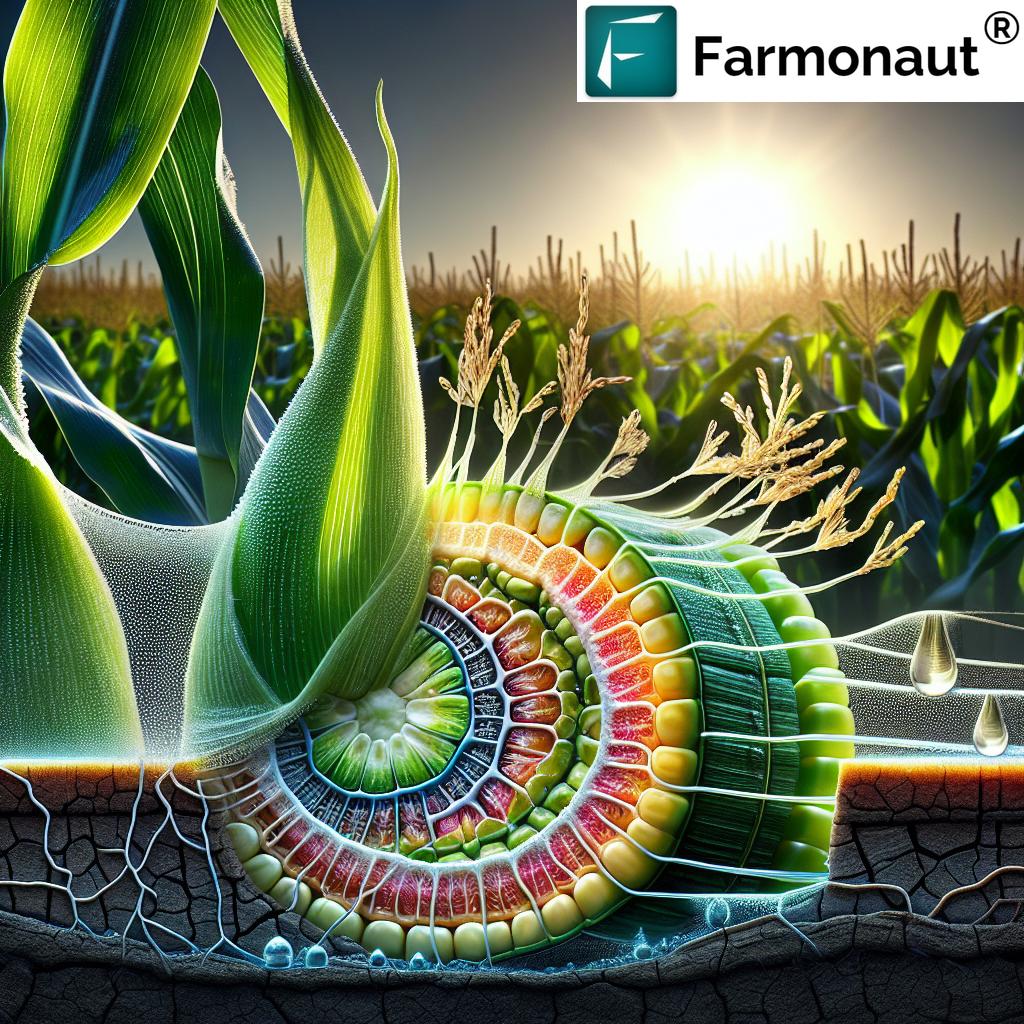
Drought Resilience Strategies for Iowa Corn Farmers
In the face of changing climate patterns, implementing drought resilience strategies is crucial for Iowa corn farmers. Here are some effective approaches:
- Conservation Tillage: Reduces soil water evaporation and improves water infiltration.
- Drought-Tolerant Hybrids: Select corn varieties bred for water stress resistance.
- Precision Irrigation: Use technologies like drip irrigation for efficient water delivery.
- Cover Crops: Improve soil structure and water-holding capacity during off-seasons.
- Water-Efficient Crop Rotations: Incorporate crops like sorghum or sunflower that require less water.
Farmonaut’s platform can assist in implementing these strategies by providing data-driven insights into crop health, soil moisture, and weather patterns. Our AI-powered advisory system can help farmers make informed decisions about when to implement these drought resilience measures.
High-Yield Corn Farming Techniques Leveraging Water Efficiency
To achieve optimal corn yields while maintaining water efficiency, consider these advanced farming techniques:
- Variable Rate Irrigation (VRI): Adjust water application based on field variability and crop needs.
- Sensor-Based Irrigation Scheduling: Use soil moisture sensors and weather data to optimize irrigation timing.
- Deficit Irrigation: Strategically reduce irrigation during less sensitive growth stages to conserve water.
- Mulching: Apply organic mulch to reduce soil evaporation and maintain moisture.
- Precision Nutrient Management: Synchronize fertilizer application with irrigation for optimal nutrient uptake.
Farmonaut’s satellite-based crop monitoring and AI advisory system can provide valuable insights to support these high-yield techniques. Our platform can help farmers identify areas of water stress, optimize irrigation schedules, and track the effectiveness of water management strategies.
The Impact of Environmental Stressors on Corn Water Use
Environmental factors can significantly influence corn water use and overall plant health. Here’s how various stressors affect water management in corn:
- Heat Stress: High temperatures increase transpiration rates, leading to greater water demand.
- Wind: Increases evaporation from soil and plant surfaces, potentially causing water stress.
- Low Humidity: Accelerates water loss through transpiration, requiring more frequent irrigation.
- Soil Compaction: Reduces water infiltration and root growth, impacting water uptake efficiency.
Farmonaut’s weather forecasting and crop monitoring tools can help farmers anticipate and mitigate these environmental stressors. By providing real-time data on weather conditions and crop health, our platform enables proactive water management strategies.
Integrating Water Management with Nutrient Planning
Effective water management goes hand in hand with nutrient planning. Here’s how to optimize both for maximum corn yield:
- Soil Testing: Regular soil tests help determine nutrient needs and guide fertilizer application.
- Fertigation: Apply nutrients through irrigation systems for precise timing and placement.
- Split Applications: Divide fertilizer applications to match crop growth stages and water availability.
- Cover Crops: Use cover crops to retain nutrients and improve soil water-holding capacity.
- Precision Agriculture: Utilize GPS and satellite data for site-specific nutrient and water management.
Farmonaut’s platform integrates satellite imagery, weather data, and AI analysis to provide comprehensive insights for both water and nutrient management. Our Jeevn AI Advisory System can help farmers optimize their nutrient application strategies based on real-time crop health and soil moisture data.
The Future of Water Management in Iowa Corn Production
As we look to the future, several emerging technologies and practices are set to revolutionize water management in Iowa corn production:
- AI-Powered Irrigation Systems: Automated systems that adjust water application based on real-time data and predictive analytics.
- Nanotechnology in Water Treatment: Advanced filtration systems for more efficient water use and recycling.
- Gene Editing for Drought Tolerance: Development of corn varieties with enhanced water use efficiency.
- IoT Sensors for Precision Agriculture: Networks of sensors providing real-time data on soil moisture, plant health, and environmental conditions.
- Blockchain for Water Resource Management: Transparent and efficient systems for water allocation and trading.
At Farmonaut, we’re committed to staying at the forefront of these technological advancements. Our platform continuously evolves to incorporate the latest innovations in satellite technology, AI, and data analytics to provide Iowa farmers with cutting-edge tools for water management and crop optimization.
Conclusion: Mastering Water Management for Iowa’s Corn Future
Water management is a critical component of successful corn production in Iowa. By understanding the multifaceted role of water in corn growth – from evaporative cooling to nutrient transport and hydraulic growth – farmers can implement strategies that optimize yield while conserving this precious resource.
As we’ve explored in this guide, effective water management requires a holistic approach that integrates soil health, nutrient planning, and advanced technologies. By leveraging tools like Farmonaut’s satellite-based crop monitoring and AI advisory systems, Iowa corn farmers can make data-driven decisions that lead to sustainable, high-yield production.
Remember, every farm is unique, and the key to success lies in adapting these principles to your specific conditions. We encourage you to explore the various tools and services offered by Farmonaut to enhance your water management strategies and take your corn production to the next level.
FAQ Section
Q: How much water does a corn plant typically use during its growing season?
A: A corn plant typically uses approximately 25 acre-inches of water per growing season for optimal growth and yield.
Q: What is the most critical growth stage for water management in corn?
A: The silking and grain fill stages (R1-R6) are the most critical for water management, as water stress during these periods can significantly impact kernel development and overall yield.
Q: How can I determine if my corn crop is experiencing water stress?
A: Signs of water stress include leaf rolling, wilting, and premature leaf senescence. Farmonaut’s satellite-based crop health monitoring can also detect early signs of water stress before they’re visible to the naked eye.
Q: What are some effective drought resilience strategies for corn production?
A: Effective strategies include using drought-tolerant hybrids, implementing conservation tillage, using precision irrigation systems, and incorporating cover crops into your rotation.
Q: How can precision agriculture tools help with water management in corn?
A: Precision agriculture tools, like those offered by Farmonaut, can provide real-time data on soil moisture, crop health, and weather conditions. This information allows farmers to make informed decisions about irrigation timing and volume, optimizing water use efficiency.
We hope this comprehensive guide has provided valuable insights into mastering water management for optimal corn yield in Iowa. Remember, effective water management is key to sustainable, high-yield corn production. By leveraging advanced technologies and implementing best practices, you can ensure your corn crops thrive even in challenging conditions.
For more information on how Farmonaut can help you optimize your corn production through advanced satellite-based farm management solutions, please explore our services:
Farmonaut Mobile Apps:





